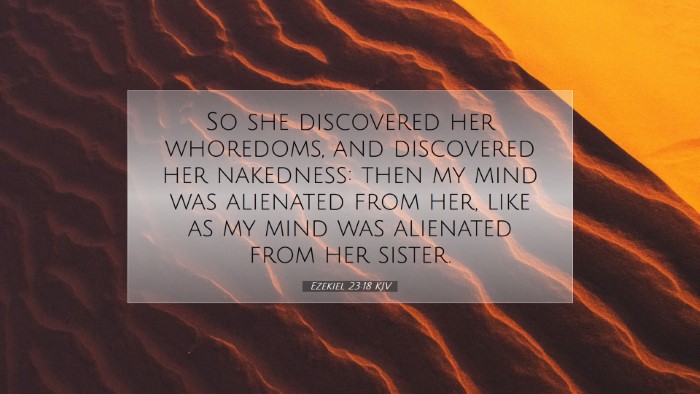Ezekiel 23:18 - A Commentary
Introduction
The verse Ezekiel 23:18 presents a vivid and striking illustration of the spiritual condition of Israel. It speaks to the themes of unfaithfulness and the consequences of forsaking God. Through a metaphorical representation of two sisters, Oholah and Oholibah, God uses the prophet Ezekiel to convey the spiritual infidelity of the people of Israel. This commentary seeks to unpack the layers of meaning within this verse, drawing insights from the public domain commentaries of Matthew Henry, Albert Barnes, and Adam Clarke.
Text of Ezekiel 23:18
"So she discovered her wickedness, and discovered her nakedness: then my mind was alienated from her, as I saw her lustful actions."
Historical and Cultural Context
Understanding the Background
To fully grasp the significance of this verse, one must understand the socio-political climate of Israel during Ezekiel's time. The nation was in a state of exile; the northern kingdom had been overtaken by Assyria, and the southern kingdom was on the brink of destruction by Babylon. This tumultuous backdrop serves as a canvas for Ezekiel's prophecies.
- The Symbolic Sisters: Oholah (referring to Samaria) and Oholibah (referring to Jerusalem) symbolize the two kingdoms of Israel and Judah, reflecting their attitudes toward God.
- Spiritual Adultery: The sisters' unfaithfulness represents the idolatry and spiritual adultery practiced by the people, as they turned to foreign nations and gods rather than remaining loyal to Yahweh.
Verse Breakdown
An Exegesis of Key Phrases
This verse contains significant phrases that merit further analysis. Let us examine these key components:
1. "So she discovered her wickedness"
Matthew Henry's Insight: Henry interprets this as an acknowledgment of sin, where the "she" refers to the wayward nation that unveils its wrongdoing. The self-revelation of sin is necessary for repentance.
2. "and discovered her nakedness"
Albert Barnes's Commentary: Barnes notes that nakedness symbolizes vulnerability and exposure. Metaphorically, it illustrates the public shame that results from unrepentant sin. To be 'naked' before God is to stand exposed without the covering of righteousness.
3. "then my mind was alienated from her"
Adam Clarke's Reflection: Clarke emphasizes the emotional aspect of God's response. Alienation speaks to the deep pain God feels as His people choose to wander away from His love and commandments. It reflects the broken relationship caused by transgression.
4. "I saw her lustful actions"
The Nature of Sin: The 'lustful actions' highlight the active pursuit of sinful desires. This isn't merely passive wandering but an active engagement in behaviors that are contrary to God’s will.
Theological Implications
The Urgency of Repentance
This verse underscores a critical theological theme—the necessity of repentance. The act of uncovering sin and acknowledging wrongdoing is paramount in the life of believers. The distance created between God and His people serves as a dire warning against complacency in spiritual matters.
- God's Justice: As the God of justice, He cannot condone sin. His alienation signifies the depth of the offense against Him.
- Understanding Grace: While the verse highlights judgment, it also opens doors to grace for those who return to Him with heartfelt repentance.
Application for Today
Lessons for Modern Believers
In reflecting on Ezekiel 23:18, modern believers can draw several important lessons:
- Examination of Hearts: Like Oholah and Oholibah, individuals must perform regular examinations of their hearts to ensure they remain in covenant with God.
- Community Accountability: The communal aspect of faith is vital. Just as the actions of one sister affected the other, believers today must hold each other accountable in their spiritual journeys.
- Responding to Alienation: If an individual feels distant from God, this scripture encourages an honest confrontation of sin and a return to Him.
Conclusion
In conclusion, Ezekiel 23:18 serves as a poignant reminder of the consequences of spiritual infidelity. Through the lenses of esteemed commentators like Matthew Henry, Albert Barnes, and Adam Clarke, the rich tapestry of insights reveals the weight of sin, the emotional response of God, and the hopeful call to repentance. For pastors, students, theologians, and Bible scholars, this verse invites reflection on the nature of their own relationship with God and an earnest pursuit of faithfulness in every aspect of life.


